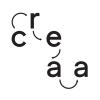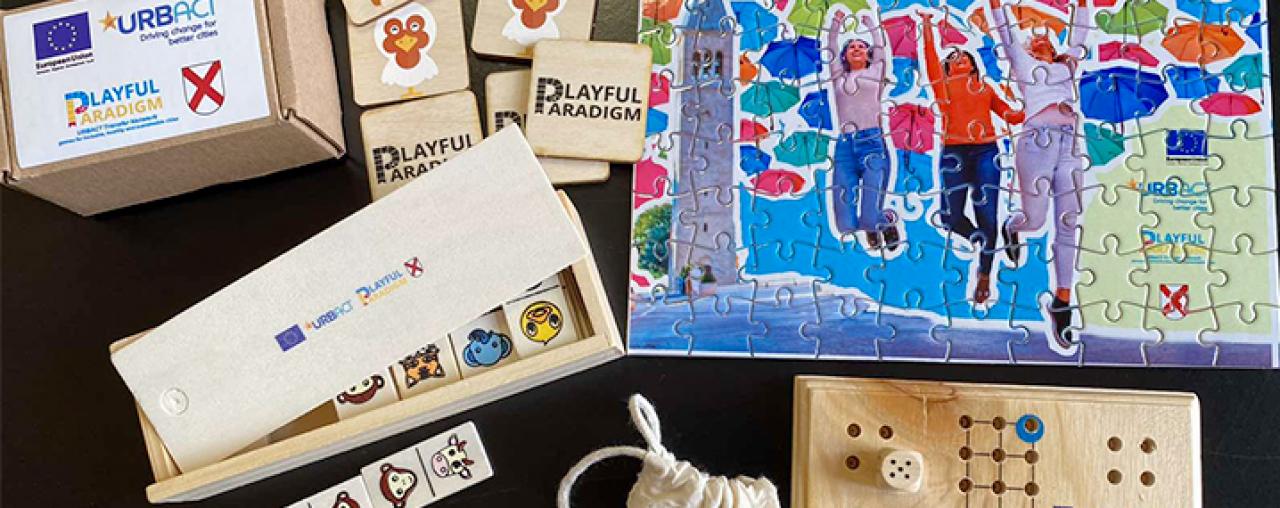
By Corinne Pozzecco - Project Coordinator "Playful Paradigm" and Senior Administrative Project Office at Novigrad City Administration
Novigrad has always been a city with a great sense of belonging and unity. Being a small city, of only 4.345 inhabitants, social life is pretty active and the level of collaboration is remarkable.
Having the chance of being a project partner in the „Playful paradigm“ for Novigrad was a great opportunity to learn to maximize and valorize this feature and learn new and inventive ways to make people connect through games and playing, using it as a tool to create new content for our community.
The main modules we decided to transfer were about the involvement of schools and playful events for the community. Obviously, the situation at global level with the pandemic stopped us from realizing all the foreseen activities but we still managed to achieve a part of them, and also to modify other.
Talking about community and unity, a tradition in Novigrad is to organize the New Year’s Eve celebration during the day, in order to let everybody celebrate together – children, adults and elderly. On NYE 2020 we managed to set up a “Playful corner” with face-painting and animation. Even if it was meant to be for the youngest, in the end a lot of adults got their faces painted and enjoyed the singing and dancing, so… mission accomplished!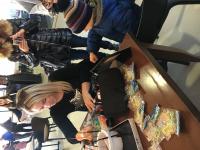
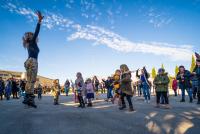
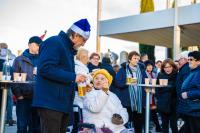
Another traditional event in Novigrad is the open-air event for the 1st of May (Labour day). On a beautiful spot, a park just near the sea, everyone can spend all day socializing with a special gastronomic offer, sports and recreational facilities, music animation and other activities. Also, a recreational walk and bike ride is taking place, everyone can participate for free. All-day entertainment consists in sports and retro games such as „three on three" beach volleyball tournament, "border guards", "rubber bands", "shins", "school” and so on. Our idea was to upgrade the existing event with the already implemented “Playful corner”, brand a part of the existing well-known event and enrich it with more games and playing specially designed to include all age group and enhance interaction and engagement. Unfortunately, just a few months before the event the lockdown started so we weren’t allowed to organize gatherings of any kind.
Even if we couldn’t organize further events and activities which includes social interaction due to the pandemic, we focused on what we can do at the moment so during the first lockdown the ULG sat down and collected a set of classic social games to do at home with only pen, paper and imagination which has been posted and reposted on various local web pages and social media. We realized that in a totally new and unknown situation, additional stress is to avoid as it’s negative impact on the immune system is well known. What better way to relax than play? 
As we are limited at the moment with the actual implementation of the modules we decided to transfer, we dedicated our time to the learning process and comparison with the other project partners, to discover the similarities and practices we can replicate locally.
Both the Cities of Udine and Cork really are great examples of adding the playful ingredient into existing events to increase social inclusion and healthy lifestyles.
The ULG coordinator in Novigrad, Mrs Morena Moferdin states: “Although I already knew that games help in social integration and socialization, it was only by joining this project that I learned that these concepts can be included in the city's development strategy, as the city of Udine has done. I realized that what we had been doing for some time at the Novigrad city library, of which I am the director, and that was the use of games for children's learning, could be raised to a higher level, creating a network of all public institutions that promote healthy lifestyles. Although this has not yet happened, primarily due to the advent of the new coronavirus, I am optimistic, and I believe that over time we will be able to connect the local library, the museum, local schools, the city administration and the retirement home into a network that will provide its users with the ability to play at every corner. It is certainly important that such a network is accepted and financially supported by the city authorities. For me, the lectures of experts or the experiences of other cities involved in this project were of particular importance. This time I would like to highlight the topic of city planning or revitalization of neglected parts of the city, with the participation of citizens. It is incredibly important to give citizens the opportunity to say what they want, what their ideas are, and to come to a solution in a participatory way. In this way, we would create public spaces that citizens use, take care of, and come to on purpose to play and socialize. I hope that in the near future our city will accept that bottom up approach which encourages civic activism. Although many ideas and best practices that I have had the chance to hear during Playful Paradigm study visits and transfer networks were inspiring and great, they were not suitable for transfer for such a small city as Novigrad that has less than 5.000 inhabitants. We could not implement a ludobus, a toy library, or a dedicated office for play activities, but nevertheless, we were able to transfer a few smaller scale best practices. At the library, we set up a small corner dedicated to books and toys for toddlers and their parents that would facilitate play activities between kids and parents. Together with the project coordinator at the City of Novigrad, Corinne Pozzecco, we created an online guide of “stay at home games” that could be played during lockdown.
The City of Cork has done a great job with many thoughtful games that they have incorporated into existing events (…) Through their examples I realize how important playing in public spaces could be for social inclusion and urban development in the process of placemaking.”
The City of Cork gave us some great advices, so Denise Cahill states: “As a result of Playful Paradigm we have learned that play is for everyone and that the experience of play is best when it is unplanned, unguided and self-directed. The games we have introduced to events and festival in Cork City include cooperative games such as tug or war and giant jenga, creative games chalked out by graphic artists and children e.g. hopscotch and free play with bags of equipment on offer to anyone to take what they choose and engage with it. We learned from the Ludobus experience in Udine that adults should not direct play, they should step back and only engage if requested or if there is a safety issue. Children then use their imaginations to create their own games with their own boundaries. During our School Streets event children transformed Giant Jenga into Giant Dominios and developed their own races with hula hoops and parachutes and bean bags. The key to a good play set up is a variety of equipment for all ages and levels of ability and lots of space to create and interact and have FUN FUN FUN”.
Different cities tackle with different problems. The City of Udine gave a great example of social inclusion with their event “Coloriamo la citta’” (Let’s paint our city) organized in a specific area of the city (Borgo Stazione). The use creativity and the city itself as a scenography for playing and promoting social inclusion is very inspiring so it can definitely be a great event to replicate in Novigrad when it will be feasible. In Novigrad the problem with immigration is non-existent but we can use an idea like the one from Udine to stimulate children’s creativity and revitalize less frequented city locations.
With the great examples and new knowledge about playmaking and placemaking gained during the transnational meetings and online meetings of the project, we now have plenty of new ideas how to make the existing events even more playful and inclusive.
As we couldn’t enter the schools and other institutions due to the pandemic, we decided to come up with an idea to disseminate the key idea of the project and promote it in a playful way. We decided to produce promotional materials in the form of branded wooden social games as domino, ludo, memory and a puzzle. This way, we can do some promotion of the project and motivate the community to play together. We distributed the promotional materials to kindergartens, the retirement home, schools, so that the brand “Playful Paradigm” is spreading all over and making everyone play. We thought that branding games that keeps the mind active and stimulates memory are valuable for both children and elderly and at the same time the promo materials are made of wood, to make them sustainable and in line with the key philosophy of the project – inclusive, sustainable and healthy living.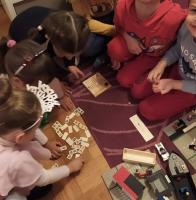
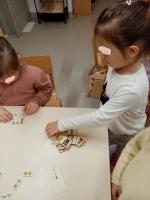
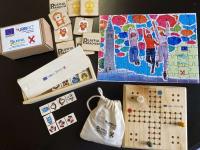
By Corinne Pozzecco - Project Coordinator "Playful Paradigm" and Senior Administrative Project Office at Novigrad City Administration

